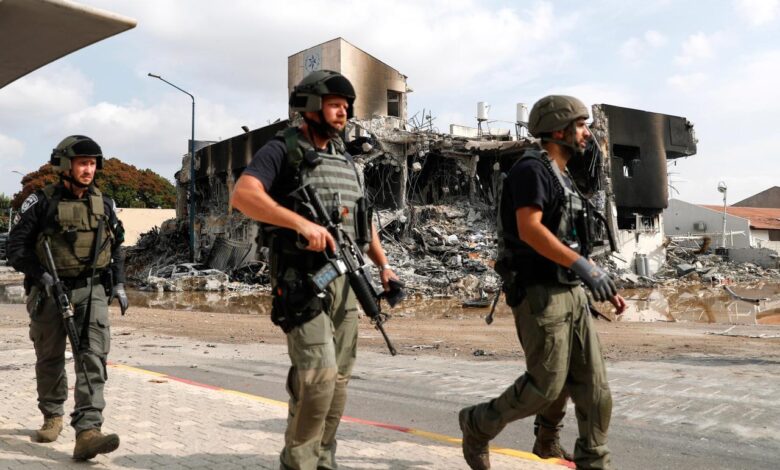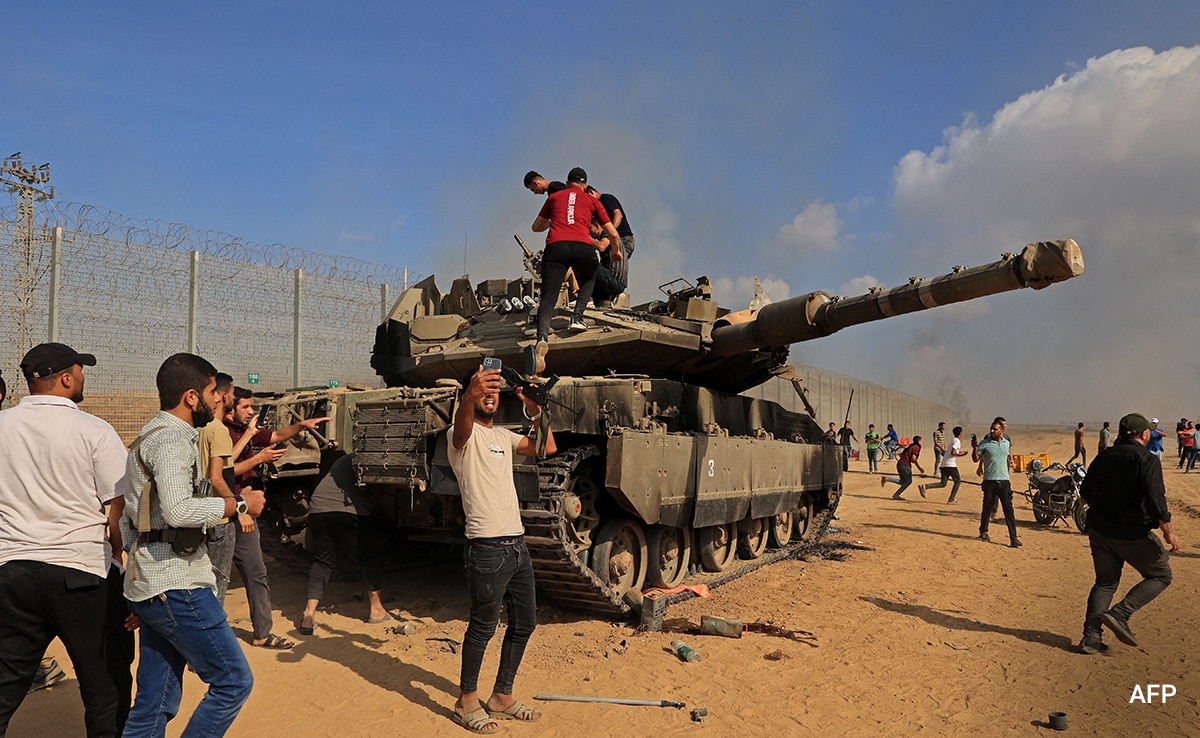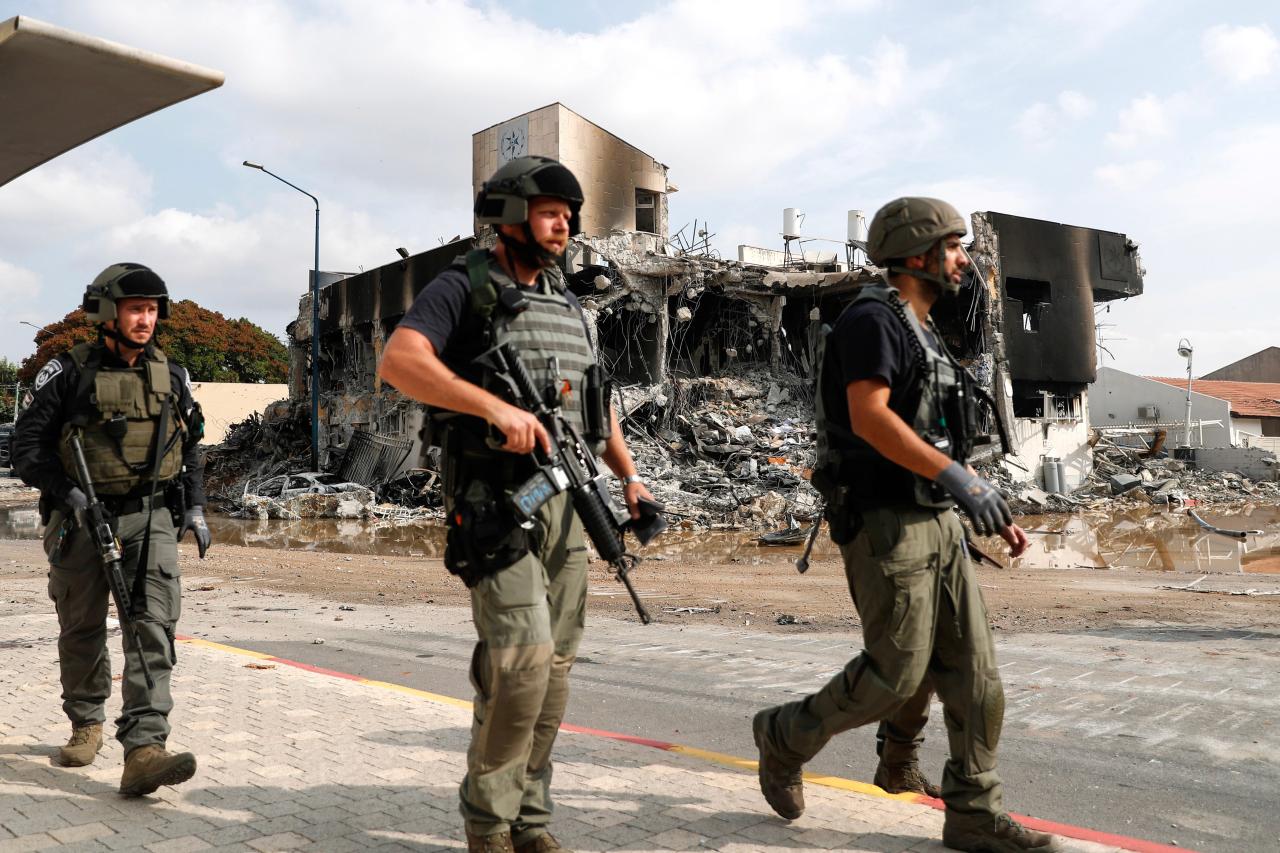
Talk of War Between Israel and Lebanon is Growing
Talk of war between Israel and Lebanon is growing, and the tension is palpable. This isn’t just another news cycle; it’s a simmering conflict with deep historical roots, fueled by present-day events and the ever-present threat of Hezbollah. The potential consequences – humanitarian, economic, and geopolitical – are staggering, and the world watches with bated breath. We’ll delve into the history, the current triggers, and the potential outcomes of this increasingly volatile situation.
From the 1982 Lebanon War to the Second Lebanon War in 2006, the relationship between Israel and Lebanon has been marked by periods of intense conflict punctuated by uneasy truces. Understanding this history is crucial to grasping the current anxieties. Hezbollah’s growing military strength, regional power plays involving Iran and Syria, and the internal political fragility of both Lebanon and Israel all contribute to the volatile mix.
The potential for escalation is very real, and the stakes are incredibly high.
Historical Context of Israel-Lebanon Tensions
The relationship between Israel and Lebanon has been fraught with conflict for decades, shaped by complex historical, political, and religious factors. Understanding the current heightened tensions requires examining the long and often bloody history of their interactions, marked by periods of intense fighting interspersed with fragile attempts at peace. This history is deeply intertwined with regional power dynamics and the enduring impact of the Palestinian conflict.
Key Events Leading to Current Tensions
The roots of the current tensions lie deep in the past, extending back to the creation of the State of Israel in 1948. The ensuing Arab-Israeli War saw significant involvement from Lebanon, with Palestinian groups finding refuge within its borders. This led to a protracted involvement of Lebanon in subsequent conflicts, significantly impacting its internal stability and its relationship with Israel.
The Lebanese Civil War (1975-1990), further complicated matters, creating a breeding ground for various militias, some of which engaged in cross-border attacks against Israel. The presence of Hezbollah, a powerful Shia Islamist political party and militant group, significantly altered the regional dynamics and became a central actor in the ongoing conflict. Hezbollah’s acquisition of advanced weaponry and its close ties with Iran have continuously fueled instability along the border.
Recent cross-border incidents and escalating rhetoric point towards a potential for further escalation.
Timeline of Significant Conflicts and Peace Agreements
A chronological overview of key events helps illuminate the cyclical nature of the conflict:
| Conflict/Event | Years | Key Actors | Outcome/Impact |
|---|---|---|---|
| 1948 Arab-Israeli War | 1948 | Israel, Lebanon, Arab states | Establishment of Israel; Palestinian displacement; ongoing refugee crisis |
| 1967 Six-Day War | 1967 | Israel, Arab states (including Lebanon) | Israel occupied parts of Lebanon; increased Palestinian presence in southern Lebanon |
| 1978 South Lebanon Conflict | 1978 | Israel, PLO, Lebanese factions | Israeli invasion of southern Lebanon; UNIFIL deployment |
| 1982 Lebanon War | 1982 | Israel, PLO, Syria, Lebanon | Israeli occupation of parts of Lebanon; PLO expulsion from Beirut; prolonged Israeli presence in southern Lebanon |
| 2006 Lebanon War | 2006 | Israel, Hezbollah | Significant destruction in Lebanon; Hezbollah’s increased regional influence; UN resolution 1701 |
| Ongoing Border Tensions | 2006-Present | Israel, Hezbollah | Sporadic clashes and escalations; ongoing threat of wider conflict |
Roles of External Actors
External actors have played significant roles in shaping the conflict. Syria, historically a major player in Lebanon’s internal affairs, has exerted considerable influence. Iran’s support for Hezbollah provides the group with crucial financial, military, and political backing, significantly impacting the regional balance of power. The United States, through its support for Israel and its involvement in regional politics, has also been a key player.
Other international actors, such as the United Nations, have attempted to mediate peace efforts, deploying peacekeeping forces (UNIFIL) in southern Lebanon. These external influences have often complicated efforts towards lasting peace and stability.
Current Triggers and Escalation Factors

The current heightened tensions between Israel and Lebanon, fueling talk of a potential war, stem from a complex interplay of immediate triggers, the enduring power of Hezbollah, regional geopolitical shifts, and the fragile domestic political landscapes of both nations. Understanding these factors is crucial to grasping the gravity of the situation.The recent escalation isn’t a singular event but rather a culmination of long-simmering issues that have reached a critical point.
Several incidents, though seemingly isolated, have collectively pushed the region closer to the brink.
Hezbollah’s Capabilities and Role
Hezbollah, the powerful Lebanese Shia Islamist political party and militant group, remains a central player in any discussion of Israel-Lebanon conflict. Their significant military capabilities, including a substantial arsenal of rockets and missiles, pose a considerable threat to Israel. Hezbollah’s influence extends beyond military might; it plays a significant role in Lebanese politics, wielding considerable power and influence within the country.
The escalating tensions between Israel and Lebanon are genuinely unsettling; the possibility of conflict feels increasingly real. It makes you wonder about the fragility of peace, and how easily things can spiral – much like the precarious state of retail giants, as highlighted by the question, can anyone save Macy’s ? The parallels are striking: both situations require careful management and decisive action to avoid catastrophic outcomes.
The talk of war between Israel and Lebanon only intensifies these worries.
Recent reports of Hezbollah’s increased military preparedness and its close ties with Iran significantly contribute to Israel’s security concerns. Their actions, whether direct or indirect, are consistently interpreted by Israel as provocations, escalating tensions. Hezbollah’s actions are often framed within the broader context of the Iran-Israel conflict, adding another layer of complexity.
The escalating tensions between Israel and Lebanon are genuinely worrying; it feels like we’re teetering on the brink. It’s a stark reminder that global instability impacts everything, even seemingly unrelated issues like business decisions. For example, I just read that Subaru says reluctant to further invest in the US because of pay competition from McDonald’s , highlighting how economic factors can be dramatically affected by broader geopolitical anxieties.
The potential for war in the Middle East casts a long shadow, influencing investment decisions far beyond the immediate conflict zone.
Regional Geopolitical Dynamics
The broader regional context is equally important. The ongoing conflict in Syria, the rivalry between Iran and Saudi Arabia, and the fluctuating relationships between various regional actors all impact the dynamics of the Israel-Lebanon relationship. Iran’s support for Hezbollah is a major factor, providing financial, military, and political backing that strengthens Hezbollah’s capabilities and emboldens its actions against Israel.
Any shift in regional alliances or power dynamics can quickly alter the balance, potentially leading to further escalation. For example, increased Iranian influence in the region could embolden Hezbollah to undertake more aggressive actions, increasing the likelihood of conflict.
Domestic Political Situations in Israel and Lebanon
The internal political climates of both Israel and Lebanon significantly influence their respective responses to escalating tensions. Israel’s current government faces significant internal divisions, potentially affecting its decision-making process regarding a potential conflict. Similarly, Lebanon’s political system is notoriously unstable and fractured, making a unified response to external threats challenging. This internal fragility can be exploited by actors like Hezbollah, who may perceive opportunities to advance their agenda amidst political turmoil.
The instability in both countries makes predicting their reactions to escalating tensions difficult and increases the risk of unintended escalation.
The escalating tensions between Israel and Lebanon are genuinely unsettling; it feels like we’re constantly teetering on the brink. Amidst all this, I’ve been reading about potentially unforeseen health consequences, like the article on activating the enemy within covid jabs might reactivate virus and diseases in your body , which makes you wonder about the unseen battles raging within us, too.
It’s a strange parallel – the external threat of war mirroring internal health anxieties. The uncertainty is palpable on both fronts.
Economic Consequences: Talk Of War Between Israel And Lebanon Is Growing
A renewed conflict between Israel and Lebanon would have devastating economic repercussions for both nations, significantly impacting regional stability and potentially triggering global market fluctuations. The scale of the damage would depend on the intensity and duration of the fighting, but even a short, sharp conflict could cause long-term economic instability.
Economic Impact on Israel and Lebanon
The immediate impact would be felt in the destruction of infrastructure, businesses, and residential properties. Israel, with its more robust economy, would likely recover faster, but the cost of rebuilding and the disruption to its already strained relations with its neighbors would be substantial. Lebanon, already grappling with a severe economic crisis, would face a catastrophic blow. Its fragile economy, burdened by hyperinflation and a collapsing currency, would be pushed further into despair.
The disruption to essential services like electricity and water supply, already precarious, would exacerbate the humanitarian crisis. The cost of reconstruction in Lebanon would dwarf its current capacity, potentially requiring substantial international aid, assuming it’s even possible to implement such aid amidst the chaos. A comparison could be drawn to the damage caused to Lebanon’s infrastructure during the 2006 conflict, which took years to recover from, a recovery that was never truly complete.
Disruptions to Regional Trade and Tourism, Talk of war between israel and lebanon is growing
The conflict would severely disrupt regional trade routes. Lebanon’s ports, vital for its import and export activities, would be vulnerable to attacks, severely impacting the flow of goods across the region. The closure of borders and disruption of transportation networks would also affect Israel’s trade. Tourism, a significant contributor to both economies, would come to a complete standstill.
The psychological impact of a conflict on tourists’ willingness to visit the region would extend well beyond the period of hostilities. The region’s reputation as a tourist destination would suffer, leading to long-term economic consequences. This impact could be comparable to the downturn experienced by tourism in other regions following major conflicts, such as the decline in tourism to parts of the Middle East following the 2003 Iraq War.
Impact on Global Oil and Gas Markets
While neither Israel nor Lebanon are major oil producers, the disruption to shipping routes through the Eastern Mediterranean could affect global oil and gas markets. Any disruption to the flow of oil and gas through this crucial region would lead to price volatility, impacting energy markets worldwide. The extent of the impact would depend on the severity and duration of the disruption to shipping lanes and the ability of alternative routes to compensate.
This is analogous to the impact of geopolitical events in other oil-producing regions on global energy prices. The uncertainty caused by conflict would itself drive up prices, even if physical disruption to oil and gas supplies is limited.
Potential Economic Effects on Various Sectors
| Sector | Israel – Potential Effects | Lebanon – Potential Effects |
|---|---|---|
| Tourism | Sharp decline in tourist arrivals, loss of revenue, job losses | Complete shutdown, long-term reputational damage, mass unemployment |
| Agriculture | Disruption to supply chains, damage to crops and livestock, price increases | Widespread damage to crops and farmland, food shortages, increased poverty |
| Construction | Increased demand for reconstruction, potential for economic stimulus | Significant destruction of infrastructure, long-term rebuilding needs, reliance on foreign aid |
| Finance | Market volatility, potential capital flight | Further devaluation of currency, banking crisis, increased poverty |
Public Opinion and Media Representation

The escalating tensions between Israel and Lebanon are not only a geopolitical concern but also a complex interplay of public sentiment and media narratives. Understanding how these factors shape perceptions and influence potential actions is crucial for comprehending the current situation. The narratives surrounding the conflict are often drastically different depending on the source, leading to polarized views and hindering potential peaceful resolutions.Public sentiment in both Israel and Lebanon is deeply influenced by historical grievances, security concerns, and nationalistic pride.
These feelings are often amplified and shaped by the media, which plays a significant role in framing the conflict and influencing public opinion. This influence can range from subtly shaping perceptions to outright manipulation through propaganda and misinformation.
Public Sentiment in Israel and Lebanon
In Israel, public opinion is largely shaped by a perceived existential threat from Hezbollah and other militant groups in Lebanon. Years of conflict and rocket attacks have fostered a sense of insecurity and a strong desire for self-defense. This sentiment is often reflected in a supportive attitude towards strong military action, although there might be varying degrees of support for specific operations.
Conversely, in Lebanon, public opinion is more nuanced. While there is widespread frustration with the political and economic situation, and a desire for stability, there is also significant support for Hezbollah, viewed by many as a resistance movement against Israeli occupation and influence. This support stems from Hezbollah’s social services and perceived role in protecting Lebanon’s sovereignty. The level of support, however, fluctuates depending on the specific actions of Hezbollah and the overall political climate.
Media’s Role in Shaping Public Opinion
The media, both domestic and international, plays a crucial role in shaping public perception of the conflict. In Israel, the media often emphasizes the threat posed by Hezbollah, highlighting past attacks and military capabilities. This framing can contribute to a sense of urgency and justify military actions. Conversely, Lebanese media outlets often portray Hezbollah as a legitimate resistance group defending the country against Israeli aggression.
This portrayal can garner support for Hezbollah and potentially frame Israeli actions as unwarranted acts of aggression. International media outlets offer varying perspectives, often attempting to present a more balanced view, although their reporting can still be influenced by geopolitical considerations and access to information.
Comparative Media Narratives
A comparison of media narratives reveals significant differences. Israeli media tends to focus on security threats, presenting a narrative that emphasizes the need for strong military action to protect Israeli citizens. Lebanese media, on the other hand, frequently frames the conflict as a struggle against Israeli occupation and emphasizes the humanitarian cost of Israeli actions. International media attempts to provide a more balanced view, although access to information and political biases can still shape the reporting.
The resulting disparity in narratives contributes to the polarization of public opinion and makes finding common ground more difficult.
Propaganda and Misinformation
The use of propaganda and misinformation significantly impacts the conflict. Both sides utilize various methods to shape public opinion, often exaggerating threats or downplaying their own actions. The spread of misinformation through social media and other online platforms exacerbates the problem, making it difficult to distinguish between accurate information and deliberate falsehoods. This can lead to heightened tensions and a decrease in trust, hindering any potential for peaceful resolution.
For example, the spread of manipulated images or videos portraying events in a biased manner can inflame public sentiment and escalate the conflict. Similarly, the dissemination of false claims about the intentions or actions of the opposing side can undermine trust and create a climate of fear and suspicion.
The escalating tensions between Israel and Lebanon paint a grim picture. While a full-scale war isn’t inevitable, the risk is undeniable. The interplay of historical grievances, current triggers, and the military capabilities of the involved parties creates a powder keg. International involvement, while potentially helpful, is also fraught with its own complexities. Ultimately, the human cost of any conflict would be devastating.
It’s a situation demanding careful observation and a desperate hope for de-escalation.



